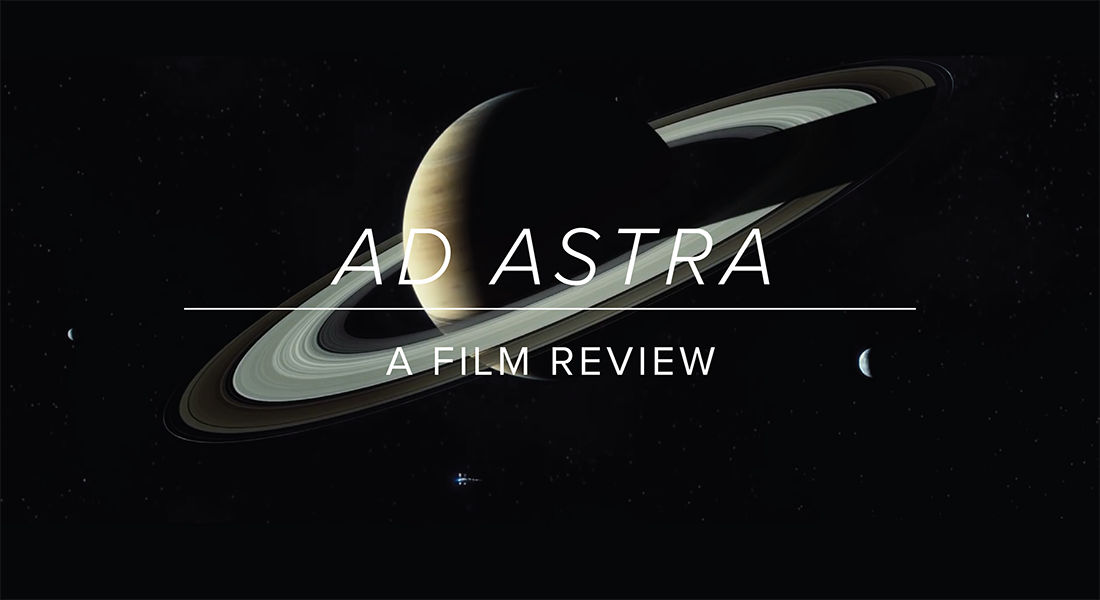
Ad Astra is a great film. It is not a teenager-targeted blockbuster space film that relies more on explosions, locker room humor, and sex appeal to hold the audience’s attention. As relieving as mental “junk food” can be after a stressful day at school or work, this movie is not that. Ad Astra is at the opposite end of the spectrum, and that’s a good thing. This is a story about hurt people dealing with hurt. The film trailers do well by setting a serious, thoughtful tone for the film. The space that the film traverses is much closer to home than most would anticipate from a sci-fi movie.
A Quick Concession Before I Continue
Before I go further, I want to make something clear: I like space movies. I have for a long time (I was a little boy at one time). I loved the fighting, the aliens, the laser guns, the heroes. As a role model, I looked up to Arnold Schwarzenegger’s special forces commando-type characters. I even identified with them. They were awesome in battle; I was awesome in (imaginary) battle. They never made bad choices, unlike the litany of tragically expendable cast-mates who were only memorable because of their increasingly creative demises. But I didn’t identify with those guys because, just like the hero, I could sense an enemy trap from miles off. I always knew just what to do. I never lost to the droves of aliens stalking my backyard pool or neighborhood park. Sure, Arnie’s enemies seemed more palpable, but they were no less imaginary than the hordes of aliens and monsters my brother and I would defeat.
However, as I’ve grown up, I’ve found myself being less and less able to relate to the heroes in my favorite sci-fi movies. As it turns out, I haven’t spent decades as a Special Forces operator. I won’t be facing swarms of aliens armed with naught but a pair of machine guns, muddied combat boots and fatigues, a strained muscle shirt, and a smoldering cigar. My monsters are so much more terrifying.
As a husband and father, I’m much less concerned with the threat of monsters that might crash land in my backyard. I fear my ability to fail my family. I fear disappointing my kids. I fear hurting the people I love most. I fear the weaknesses hiding comfortably just behind my eyes. I fear that I might be exposed as a fraud to those people who count on me most. I’d like to think that I don’t live under the constant weight of fear, and I don’t think I’m as affected by it as many people are. But there’s a reality to the idea that my fears, at some level, do encourage me to be less than transparent with my colleagues, my friends and my family.
Gravity In The Performance
And this is one of the major themes in this film. This is not simple, mental chewing gum; this is a thick cut of provocative, existential thought, and it’s handled with an approachable realism that surprised me. Part of that is due to the subtle strengths that this film brings to the table. Brad Pitt’s performance as astronaut “Maj. Roy McBride” showcases some of the reasons he’s one of Hollywood’s most sought-after leading men. Externally, with an enviable smile, physique and cool factor, he’s the type of man most men would love to be compared to. His likeableness in the Ocean’s 11 series, among many others, seems to exude a genuinely effortless charm. Pitt has a gift for portraying personable, friendly, relatable characters. But he’s also able to bring a vulnerability and introspectiveness to his roles that are so nuanced, you might forget he’s only acting the part. The gravity he brings to both his character, and Ad Astra as a whole, roots this Sci-Fi into very relatable, human-level territory.

His “Maj. Roy McBride” is the type of constant, clear-headed and heroic man a father would want to be. He has answers, a plan, focus and the decisiveness to make the best choices when things seem out of control. However, the film’s audience is omnisciently privy to his inner dialogue, and it’s this beating heart of insecurity that makes you realize how similar you are to him. On the outside, his colleagues and superiors are struck by his calm; even though he’s participated in active combat. He also recently survived a parachute escape from an exploding space tower, while his heart rate never exceeded 85bpm! He has a near-supernatural steadiness that makes him precisely the type of person NASA would want on a space mission. However, even though he can keep his heart rate down, and though he can give the correct answers needed to pass his constant barrage of psychological evaluations, he knows the truth. He has accomplished everything to which he aspired: become an astronaut, win the admiration of his peers and the approval of Military brass, and ultimately live up to his father’s legendary status. However, even with all of that, he’s separated from the woman he loves, his wife. He’s haunted by his failures, and the failures and hurts caused by those he loves. He struggles to hide his insecurity, ducking behind his duties and his stainless-steel exterior.
The Truth About Us
Unfortunately, this is very familiar territory for many of us, Christians and Pastors especially included. Many of us seek to emulate the men and women that we admire, perceiving similar calm, happy, decisive and compelling personalities. But we can only observe a tiny portion of their personhood. Similar to God’s admonition in 1 Samuel 16:4, there’s a lot more going on internally than humans can observe externally. Beneath the surface of any hero, be they pastors, leaders or social media influencers, there are layers of fear and doubt, logbooks of sins and failures and rosters of people that have been hurt, some with whom we’ve been reconciled, others not so much. And no matter how much we try to emulate the strengths of those we observe, we’re only able to see and therefore emulate a fraction of their personhood. And no matter how courageous, happy or successful we try to appear, we know the truth about ourselves. We’re haunted by the faces of our past failures or our fears of future ones. Major McBride is intimately aware of his two-faced nature, and it weighs on him. To keep it from interfering with what he needs to do, he puts an emotional tourniquet around his heart. He chokes it off from feeling anything. He disassociates from those that he holds dearest. While this makes him into the man he always wanted to be, able to do the things he’s always wanted to do, it also cuts him off from everyone that makes it all worth doing.

A Relatable Sci-Fi
And this is the greatest strength of the film. Even though you’re immersed in a science fiction world where the expanse of our galaxy seems open for exploration, it’s told through the eyes of very relatable, very vulnerable and very human characters. Where many “space films” lose me with their overly avant-garde existential musings, this film focuses on the emotional level of what things truly matter in the human experience: freedom, identity, purpose, community and love.
Ad Astra is a triumph for writer/director James Gray. In his 2016 film, The Lost City of Z, he paints a very relatable bleakness in the form of obsessive ambition.
This film feels a bit like a spiritual companion piece: the reality of living within the shadow of someone else’s obsessive ambition and the wake of destruction it has left.
Will we repeat the sins of our fathers when we chase after the mirage of success? What will be the cost of our achievements to those we love? What are our achievements costing them right now?
It’s Still Fun Though
Even though it’s heavy, the plot of the film never drags along under its own emotional weight. Scenes steadily move forward with solid action scenes, rising tension, impressive visual effects and some incredible cinematography from Hoyte van Hoyteme (Dunkirk, Spectre, Tinker Tailor Soldier Spy), opting for shooting on 35mm film rather than digital stock. Aesthetically, the film has a beautifully filmic look and feel. Max Richter’s score moves dynamically between subtle and powerful, conjuring equal parts vintage and futuristic. Ad Astra has all the joys and grandeur of a modern cinematic classic. This is one you’ll want to see at the cinema to truly enjoy the “largeness” of the score and the vastness of the setting.
In an age of digital film, digital effects, digital characters and digital delivery at home, this film is a relief. It’s well written, well-acted and well produced. More than that, it leaves you with much to think through, and that’s always something I admire in a good film. I don’t always want a film that only entertains; I want to be taken on an immersive journey; I want to be provoked. And the plot here is definitely provocative. This film reads our culture so well. In an age when people present such fictionally successful personas on social media, it’s refreshing to see someone like James Gray deal with what’s vulnerable and flawed. The script is written with such a subtle touch, it seems to reflect genuine emotion from sorrows of his own past.

The Heart of the Matter
Ad Astra (“to the stars” in Latin) is a voyage through space, but it’s also a thoughtful meditation on the human heart. It takes you across lunar landscapes just as gracefully and believably as it crosses topics like melancholy and love. But it’s not just a story exploring or explaining depression, isolation and listlessness. Ad Astra has a strong redemption message. And redemption is precisely what people need. As humans, we’re all broken and burdened; we’ve all been hurt to some degree. But we have a choice: We can remove ourselves from the possibility of being hurt again, or we can make our hearts accessible to love. As much as we want to believe that it’s possible to do both well, in truth, we can’t. We’re either vulnerable or unreachable. As a “space movie,” I was surprised to see such a close similarity to, and an almost parabolic expansion of a thought from C.S. Lewis:
“To love at all is to be vulnerable. Love anything and your heart will be wrung and possibly broken. If you want to make sure of keeping it intact you must give it to no one, not even an animal. Wrap it carefully round with hobbies and little luxuries; avoid all entanglements. Lock it up safe in the casket or coffin of your selfishness. But in that casket, safe, dark, motionless, airless, it will change. It will not be broken; it will become unbreakable, impenetrable, irredeemable. To love is to be vulnerable.” ― C.S. Lewis, The Four Loves
Clocking in at just over two hours, it’s well worth the time to watch it. It will leave you thinking about your life, your choices and your identity in Christ.
Ad Astra is rated PG-13 for some violence, bloody images and brief strong language.
CalvaryChapel.com does not necessarily endorse or agree with every message or perspective in the diverse film reviews posted. By providing these film reviews, we hope to help you stay informed of important events and conversations taking place in the world that are relevant to the Christian faith.






